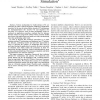Free Online Productivity Tools
i2Speak
i2Symbol
i2OCR
iTex2Img
iWeb2Print
iWeb2Shot
i2Type
iPdf2Split
iPdf2Merge
i2Bopomofo
i2Arabic
i2Style
i2Image
i2PDF
iLatex2Rtf
Sci2ools
CLUSTER
2007
IEEE
2007
IEEE
Evaluation of fault-tolerant policies using simulation
— Various mechanisms for fault-tolerance (FT) are used today in order to reduce the impact of failures on application execution. In the case of system failure, standard FT mechanisms are checkpoint/restart (for reactive FT) and migration (for pro-active FT). However, each of these mechanisms create an overhead on application execution, overhead that for instance becomes critical on large-scale systems where previous studies have shown that applications may spend more time checkpointing state than performing useful work. In order to decrease this overhead, researchers try to both optimize existing FT mechanisms and implement new FT policies. For instance, combining reactive and pro-active approaches in order to decrease the number of checkpoints that must be performed during the application’s execution. However, currently no solutions exist which enable the evaluation of these FT approaches through simulation, instead experimentations must be done using real platforms. This increase...
Related Content
| Added | 02 Jun 2010 |
| Updated | 02 Jun 2010 |
| Type | Conference |
| Year | 2007 |
| Where | CLUSTER |
| Authors | Anand Tikotekar, Geoffroy Vallée, Thomas Naughton, Stephen L. Scott, Chokchai Leangsuksun |
Comments (0)

